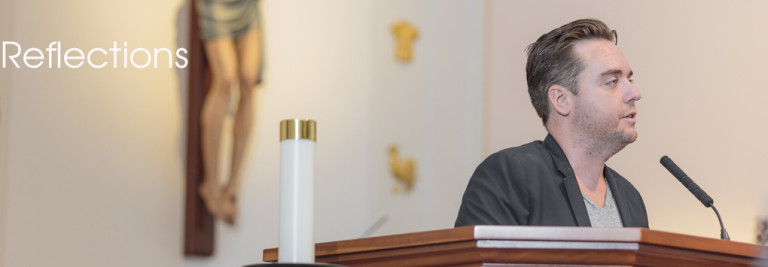Hearing the news of another horrific attack in France of the murder of an aged priest while saying Mass affected me differently than previous attacks. Perhaps it was my own prejudice and inherent self-centeredness that made me swell with anger. Perhaps it was because that could have been me in that sleepy morning daily Mass. I can relate to the scene much more than I could of me, let’s say, at a Bastille Day celebration. My first reaction was anger, not sadness. In prayer, I quickly tried to replace my righteous indignation with mercy, but then I thought of an exchange that occurred with fellow parishioners at our “From Elijah to Tenafly” Carmelite spirituality discussion group. We were talking about the predominately Jewish tradition of arguing with God.
We are offered a dual image from a story we were reading: One of Elijah raising a man from the dead and Jesus raising another widow’s son from the grip of mortality. What is so interesting in comparing these two bewildering stories—once we get over the wonder of someone being raised from the dead—is the way Elijah and Jesus approach the initial learning of the widow’s grief. First, Jesus; we’ll get to Father Elijah in a moment. Jesus’ reaction is so beautiful — he is “moved with pity for her [the widow] and said to her, ‘Do not weep.’” Jesus is immediately moved with compassion and deep empathy, even the small image of him touching the casket, is charged with love. Finally, my favorite line in the Gospel, after bringing the boy back to life: “Jesus gave him to his mother.” This line intones that the boy must have been a child if the thirty(ish) year old Jesus can carry him. All very beautiful.
Now back to our fiery prophet near Mount Carmel. Elijah, upon hearing of the death of the widow’s son, is filled with righteous anger. He goes so far as even accusing God of murder! “O Lord, my God, will you afflict even the widow with whom I am staying by killing her son?” He cries. Now, this might seem wildly inappropriate, but it comes from a real place. Elijah is becoming radicalized by the death and poverty he is witnessing.
For centuries we’ve tended to view Jesus’ way of reacting to God’s difficult and mysterious ways when bad things happen, to quietly say, Let go and let God. Though I think that is an over-simplification, Jesus should, of course, be emulated in all things, but I think it is quite Christian of us to argue with God. Remember, our very name, the name Israel, literally means “one who struggles with God.”
In his brilliant book Arguing with God: A Jewish Tradition, Rabbi Anson Laytner writes that it wasn’t disrespectful or out of order for the ancients to argue with God, it was quite customary. Whether Abram, Moses or Job, speaking and arguing with God followed a pattern. “First an address to God as judge, then a presentation of the facts of the case, the complaint and petition brought against God and to God, then a concluding petition or request made by the individual (or Israel) and, finally, a divine response to the petition.” (Laytner, 83). So being angry with God — questioning Him — can be a protest. The best kind of protest, whether non-violent social justice in the streets or a soul’s crying out at a funeral, often is prayer. Like any other relationship in our lives, to argue with a loved one means that you trust and are committed enough to care.
Praying to our new blessed martyr, Fr. Jacques Hamel, I am comforted with another reminder this weekend. Paul’s words in this Sunday’s second reading, “Here there is not Greek and Jew, circumcision and uncircumcision, barbarian, Scythian, slave, free; but Christ is all and in all” (Colossians 3:11). Reminding me yet again, that we are one family and to realize that as easily as I could have been attending that quiet Mass, I just have easily could have been the angry young man wielding the knife if it wasn’t for the gift of our Savior.
Have a blessed week. Fr. Jacques Hamel, pray for us!
I’ll be seeing you,
Elliot



